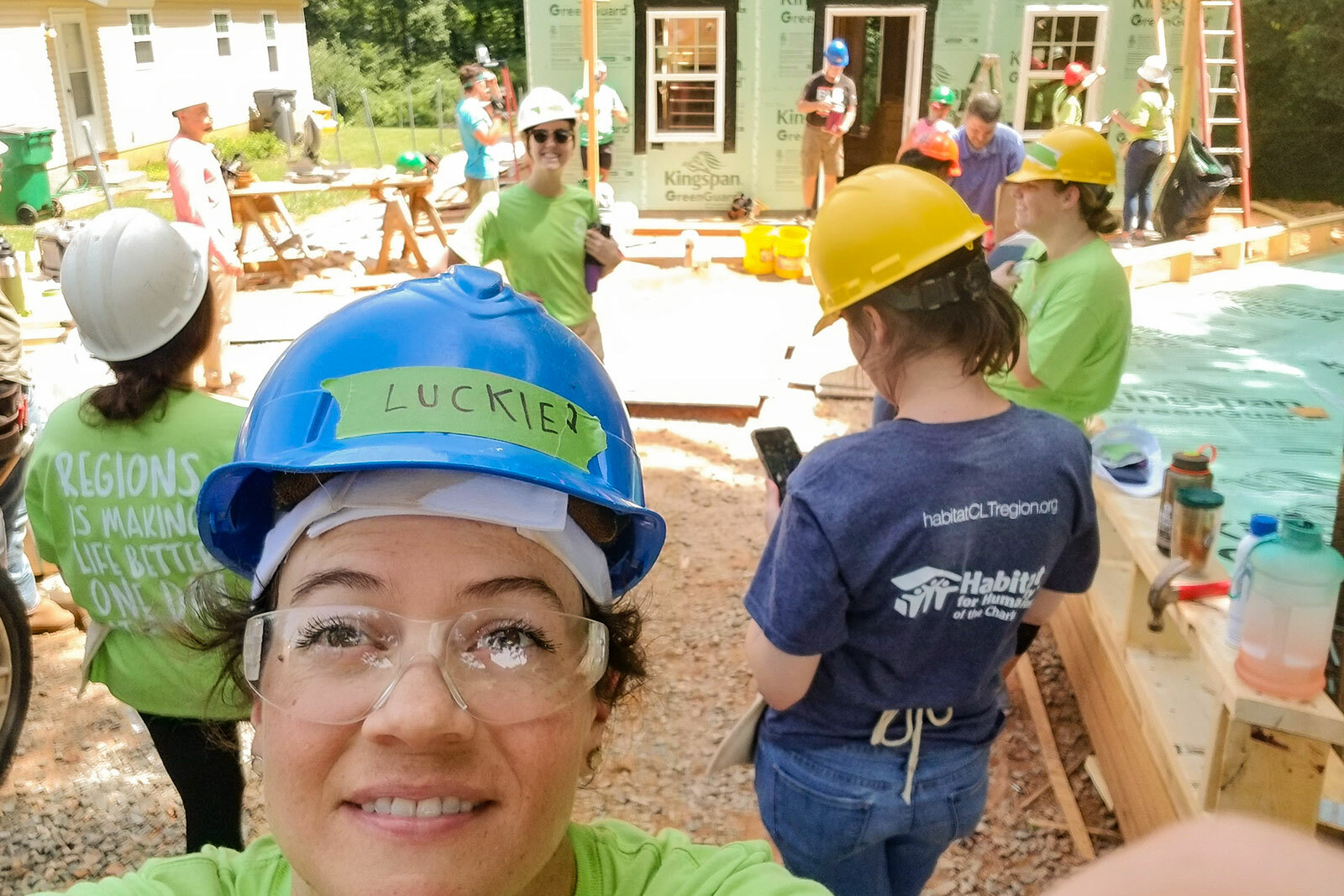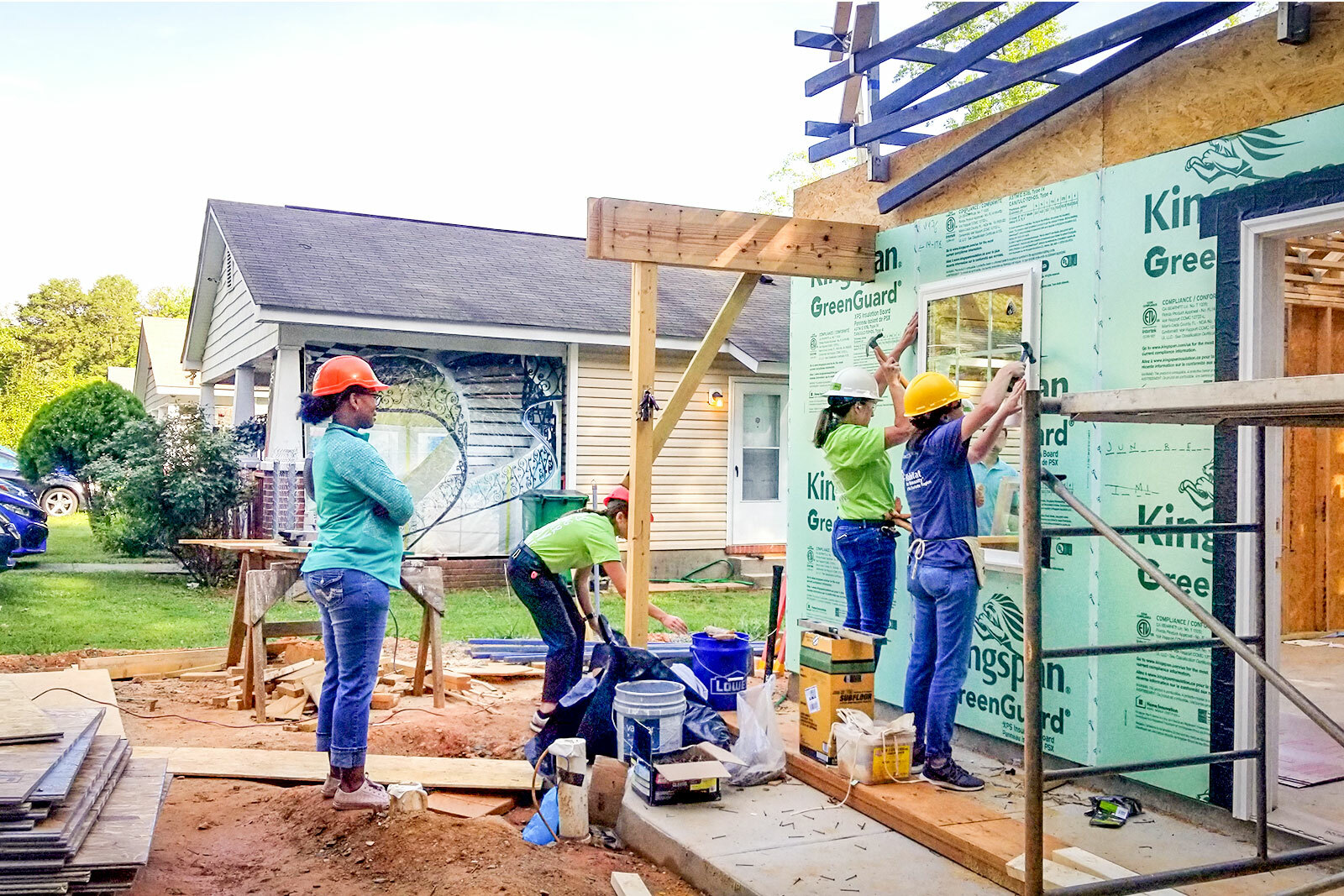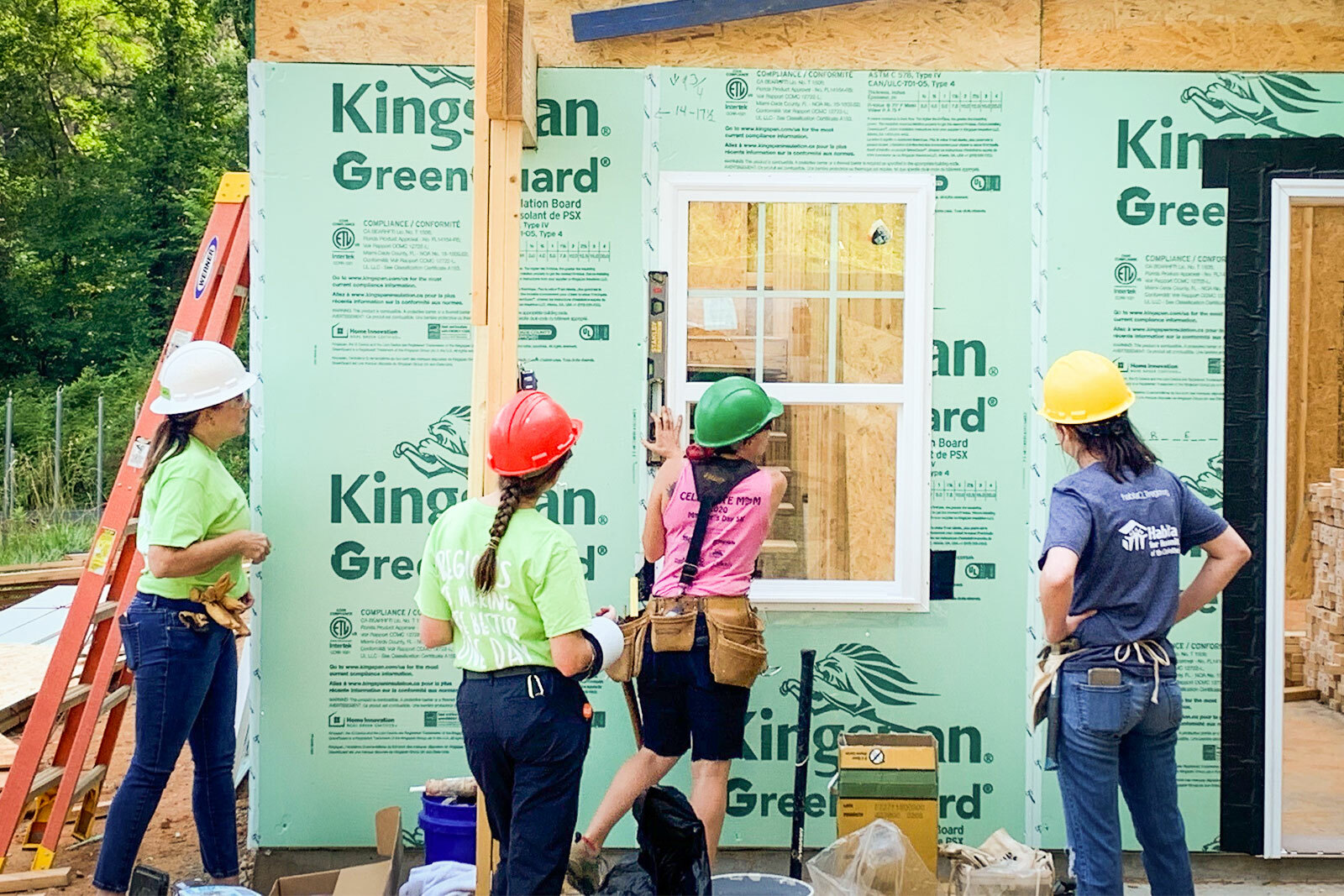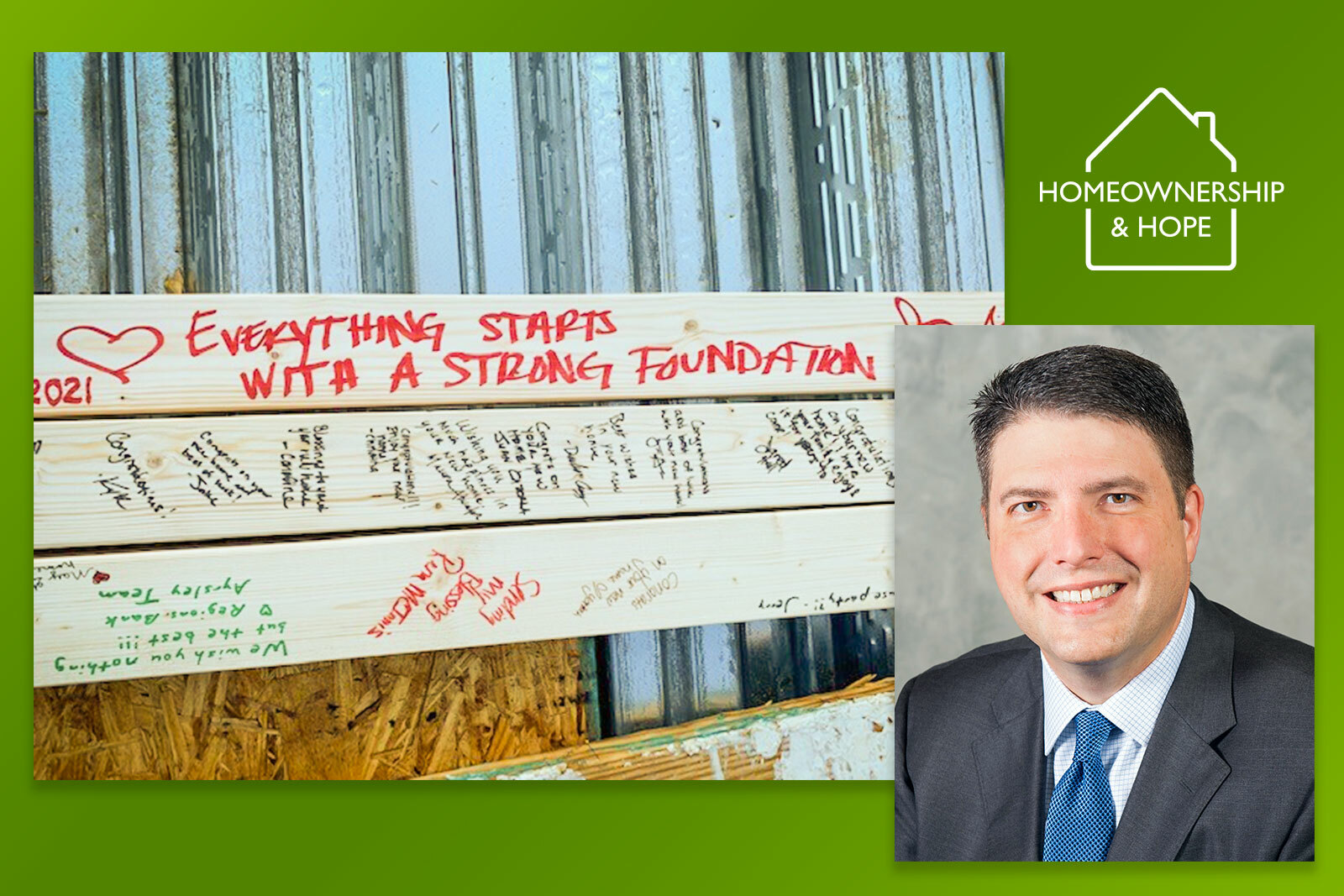Confidence. Pride. A sense of accomplishment.
They’re three things Habitat for Humanity provides not just to homeowners, but also to its 1.4 million volunteers.
Regions Bank and its associates support Habitat for Humanity affiliates across 15 states through donations and thousands of volunteer hours. It’s part of the bank’s commitment to advancing affordable housing and as an Equal Housing Lender.
In 1991, Habitat for Humanity launched its Women Build, a volunteer program providing women with proactive service opportunities in all 50 states and internationally. To date, more than 2,700 homes have been constructed through Habitat Women Build events.
The first Women Build took place in Charlotte, North Carolina. Thirty years later, we highlight a group of Regions associates in Charlotte involved with a Women Build. It’s the latest story in our “Homeownership and Hope” series. Discover how team members traded their banking attire for toolbelts here.
 Tracy Wilson captures her Regions teammates during a short break. Wilson assisted with installing the home’s second-story flooring.
Tracy Wilson captures her Regions teammates during a short break. Wilson assisted with installing the home’s second-story flooring.
Every board, every nail, every shingle play a role in constructing a house. But it’s the people, the volunteers who make a Habitat home so special.
This was just one of the key takeaways a group of Regions associates gained from a recent Habitat Charlotte Region Women Build project, an initiative supported by a $2,500 bank donation.
“You need multiple hands to install windows,” said Gretchen Bottrill, a managing director of Regions’ Energy Lending team. “It’s not something you can do on your own; it requires teamwork.”
In this case, that teamwork occurred thanks to associates from across six business groups. Pamela Rudd, a community loan mortgage officer with the bank and a member of Habitat Charlotte Region’s Finance Committee, was one of them. Rudd helped Bottrill install windows. She also assisted with insulating the home’s upper frame.
“We were cutting foam into large triangle shapes,” said Rudd. “It involved measuring and accuracy. The result looked like a mosaic made up of pieces … and it took a mosaic of us to put it all together. Everyone played their part.”
Tracey Rouse, partnerships manager with Habitat Charlotte Region, notes home-build projects often offer volunteers like Rudd a chance to connect with their colleagues in a different way — and see them in a new light.
“Habitat is known for our transformational volunteer experiences,” said Rouse. “There’s an immediate flattening of any company hierarchy that occurs at a build site. It doesn’t matter what your title is, it’s can you swing a hammer?”
Or, in Tracy Wilson’s case, can you take things to the next level?
 Bank associates tackled windows installation, a project they quickly discovered requires many hands and teamwork to accomplish.
Bank associates tackled windows installation, a project they quickly discovered requires many hands and teamwork to accomplish.
On a typical weekday, you’ll find Wilson assisting customers as a financial relationship specialist at Charlotte’s Eastover branch. But on the build day, she literally reached new heights, hoisted by a harness to install second-story flooring.
“I’m not real keen on heights,” laughed Wilson. “But it was the first thing they asked for help with, so I raised my hand. I saw it as an opportunity to take a baby step at conquering a fear.”
Bottrill and Rudd watched in awe.
“Tracy climbed right up on that roof like a beast!” said Bottrill.
“She was so uninhibited,” added Rudd. “I kept thinking, ‘Look at her go!’”
Along with teamwork and surpassing comfort zones, flexibility has also been especially needed in recent months by both Habitat volunteers and staff. There are the usual weather issues that can delay a build, but COVID-19 has presented other challenges, including reduced volunteers due to a temporary stay-at-home order, skyrocketing lumber prices and a windows shortage.
“We’ve never stopped building during the past 17 months,” said Rouse. “Each new home construction project typically requires about 1,600 hours of volunteer labor. We were grateful and proud to be able to continue, but building without volunteers dramatically increased our subcontractor costs. The pandemic has forced us to be more creative, adaptable and resourceful.”
Those are the same qualities many Habitat homeowners themselves have needed in facing financial hurdles the past year-plus.
 Volunteers are vital to Habitat’s home-build projects, with each house typically requiring about 1,600 hours to complete.
Volunteers are vital to Habitat’s home-build projects, with each house typically requiring about 1,600 hours to complete.
“One in three of our families either lost their jobs or faced a significant reduction in their wages during the pandemic,” said Rouse. “We worked quickly to connect homeowners to our city’s mortgage relief program. We also created our own mortgage relief fund thanks to the generosity of our donors. Our homebuyers have demonstrated an enormous amount of resilience and determination.”
Seeing the need and the unwavering commitment of families to achieve their dream of homeownership motivated Gretchen Bottrill to volunteer.
“Securing affordable housing in Charlotte is a challenge,” she said. “But Habitat is working to change that – one home at a time, one family at a time. They’re focused on creating upward mobility.”
Rudd agrees, comparing each home build to a ripple in a pond that creates a larger impact.
“This is making a difference not just for an individual, but helping the community,” she said. “I feel fortunate to be part of a company that allows us the time to do this. I’m proud to say my employer is totally on board.”
Also on board? Jared Hall, a senior credit officer who coordinated project details for Regions with Rouse, including transporting messages on 2-by-4 hope boards to Charlotte branches for customers and associates to sign that are now part of the home. Hall and Rob MacGregor from the Corporate Real Estate team also delivered lunch and coffee to teammates to show support.
 Jared Hall supported the Charlotte Women Build’s logistical details, including transporting messages of hope boards for bank customers and associates to sign. The boards are part of the finished Habitat home.
Jared Hall supported the Charlotte Women Build’s logistical details, including transporting messages of hope boards for bank customers and associates to sign. The boards are part of the finished Habitat home.
“Habitat has a strong legacy of providing a ‘hand up’ to families,” said Hall. “Home-build projects also offer volunteers the benefit of seeing the impact they’re making. During the Women Build, our team members developed a deeper connection with each other while helping to create something meaningful and lasting for a Charlotte family.”
Tracey Rouse was thrilled to safely welcome back volunteer groups for build projects.
“When our corporate and community partners send employee groups to volunteer with us, it’s a clear demonstration of the organization’s commitment to affordable homeownership in our community,” she said. “Group volunteering is an amazing way to not only build homes, communities and hope – it’s also a way to build camaraderie and create shared memories among the team.”
And it’s a day Rudd and her teammates won’t soon forget.
“It was definitely work, but to me, it was the best kind of work there is,” Rudd said. “You’re seeing someone’s house come together, you’re learning a new life skill and you’re doing it with others. This is how relationships are built, this is how they happen. And this is how we learn from each other.”